Can Dogs Eat Chia Seeds? Safe Superfood or Hidden Danger?
Chia seeds are often praised as a superfood for humans, but what are chia seeds? And what about dogs? Can Dogs Eat Chia Seeds? As a pet owner, you might wonder if chia seeds are safe and beneficial for your dog.
Chia seeds are white or black seeds that originate from Salvia hispanica related to the mint family. The Aztecs and Mayans have used the chia seeds for ages then it is known to be taken due to its nutritional value.
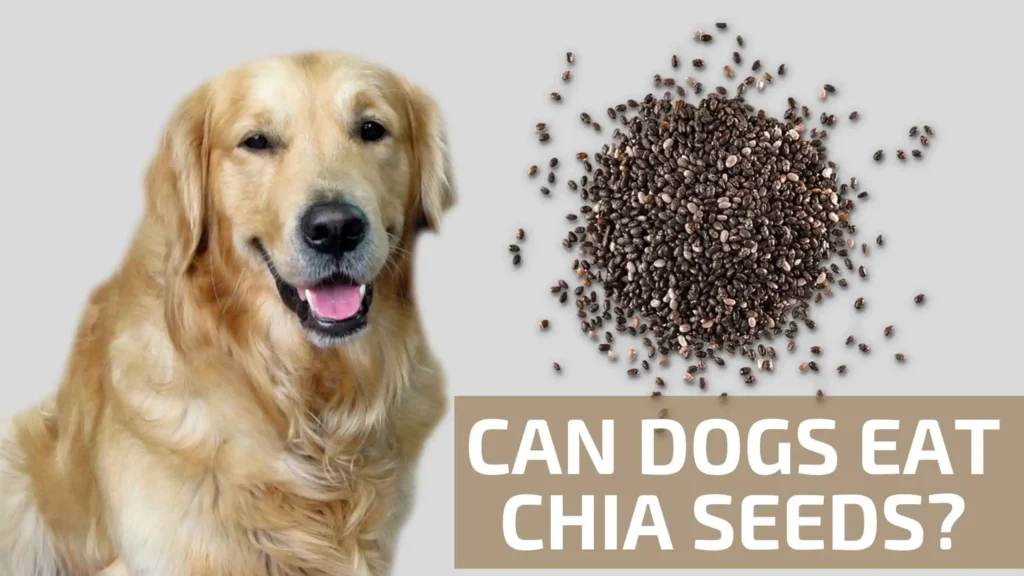
These are rich sources of fiber, protein, omega-3 fatty acids, and some essential minerals required by the body. Another reason is that the chia seeds have a high moisture absorption capacity as they swell in liquid and form gel-like substances that are healthy for the digestive tract.
However, to top up your knowledge before you incorporate them into your dog’s meal, it is crucial to find out if chia seeds are safe for dogs and if they are healthy.
Can Dogs Eat Chia Seeds?
Dogs can consume chia seeds as well these are great additions to your pet diary provided it is in moderation only. Chia seeds are safe for dogs and come with various health benefits that include enhancing digestion, boosting brain functions, and improving skin health. But just like any additive taken into the diet of a dog, one has to go slow and observe the response of the dog.
Potential Benefits of Chia Seeds for Dogs
They are full of nutrients and there are many reasons why you should add chia seeds to your dog’s diet.
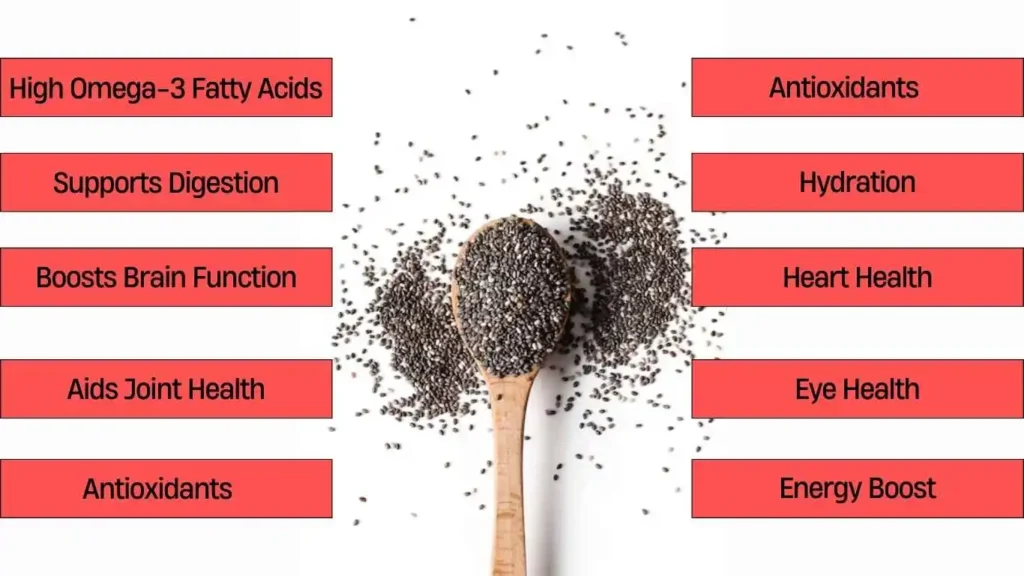
Here are the potential benefits and how can dogs eat chia seeds:
High Omega-3 Fatty Acids
Omega-3 fatty acids are a very important element that is essential for your dog’s well-being. They also assist in the decrease of inflammation, proper functionality of the heart, and even skin and coat health.
Omega-3 fatty acids, which are important for heart and skin health, brain functions, and the immune system, can be found in chia seeds, in large quantities, which should make chia seeds a valuable part of any dog’s diet.
Supports Digestion
Can dogs eat chia seeds for good digestion? Yes, chia seeds are helpful in digestion since they are rich in fiber. They swell when wet which can be very beneficial in managing the bowel movement of your dog and on the kind of gut that your dog has. All that is needed is to make sure that your dog drinks a lot of water since chia seeds are known to swell up to twelve times their size in water.
Boosts Brain Function
Chia seeds also contain omega-3 fatty acids which not only improves the health of the heart but also of the brain. They can improve brain power and this is very important when it comes to elderly dogs. Perhaps, feeding chia seeds can make your dog as sharp-minded as most people who consume the seeds.
Aids Joint Health
Can dogs eat chia seeds for joint health? Lack of mobility is a major problem as many dogs are affected by joint pains particularly when they are old or breed of that nature. Due as they are to their anti-inflammatory effects, omega-3s can also help decrease joint pain and increase mobility, which is why chia seeds are good for dogs with arthritis or some joint issues.
Other Benefits of Chia Seeds for Dogs
- Fiber: Good for digestion, help against constipation and weight loss Chia seeds have a lot of fiber which is beneficial for our digestive system.
- Protein: Chia seeds also provide a considerable dose of the upper protein that is important for tissue construction and repair.
- Antioxidants: Another critical nutrient you get from Chia seeds includes antioxidants that may shield cells from harm.
- Hydration: Chia seeds swell when they come into contact with liquids hence ensuring that your dog drinks water.
- Energy Boost: The vitamins and minerals of the recommended fiber, protein, and healthy fat foods could support energy throughout the day.
- Weight Management: Chia seeds may also control hunger and help users to feel fuller for longer and are beneficial for those who need to lose some weight.
- Cognitive Function: Chia seeds can be useful for improving memory,-focus, and other skills that relate to the human brain.
- Eye Health: The omega-3 fatty acids are good for the eyes and could also prevent the onset of age-related eye issues.
- Heart Health: Chia seeds must be used to help reduce cholesterol rates and thereby help minimize the chances of having heart complications.
- Immune System Support: Flavonoids and other phytonutrients contained in chia seeds are useful for increasing the body’s immunity.
- Diabetes Management: Foods with low glycemic index such as chia seeds can help maintain blood sugar levels and thus assist in diabetes management.
- Improved Coat and Skin: Biologically active substances in omega-3 fatty acids and antioxidants in the product may help to enhance the quality of their hair and skin coat. The omega-3 fatty acids and antioxidants within this dog food can also benefit the health of your dog’s coat and skin.
- Reduced Allergies: Chia seeds may improve the condition of dogs who have an allergic reaction.
- Improved Digestion: One of the important benefits of chia seeds is that they contain fiber can play a role in digestion and may prevent constipation.
- Increased Energy Levels: The consumption of chia seeds leads to the attaining of natural energy.
- Weight Loss: Chia seeds are beneficial in weight loss since they provide a feeling of fullness and therefore reduce the consumption of calories.
- Muscle Growth: Chia seeds contain a certain amount of protein that can be beneficial for the development of muscles in the body.
- Improved Athletic Performance: This is because chia seeds are a good source of energy and promote proper muscle contraction and relaxation thus contributing to the energy needed in any athletic activity.
3 Hazards of Chia Seeds for Dogs
While chia seeds are generally safe, there are some risks to be aware of how can dogs eat chia seeds :
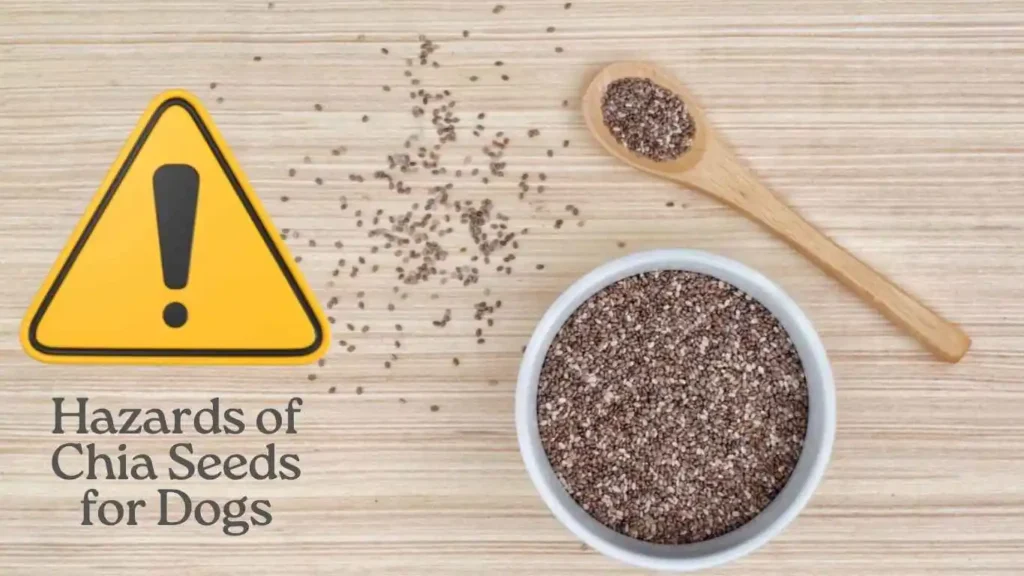
Risk of Overconsumption
Chia seeds are packed with nutrients which implies that you can eat a small portion of it and get all the nutrients it has to offer. Overfeeding can result in obesity or gastrointestinal issues will be triggered. Follow serving sizes that are recommended for a given breed of dog according to size and age.
Digestive Issues
One more thing that needs to be mentioned is in case your pet rarely eats high-fiber products, he might experience some temporary problems like bloat, gas, or diarrhea after consuming chia seeds. It’s better to start giving them slowly and in limited portions so that they don’t upset the stomach.
Allergic Reactions
It should be noted that chia seeds are not toxic to dogs but can dogs eat chia seeds for allergies? In some of the rare cases, some dogs can be allergic to them. Some of the signs that should be looked at include itching, swelling, or hives. If you find any signs of intolerance stop the use of the supplement and seek advice from the vet.
How to Safely Feed Chia Seeds to Your Dog
If you are going to feed your dog chia seeds, it is recommended that you begin with a small mouthful up to a teaspoon for toys and up to a tablespoon for large dogs. According to the brand instructions, you should mix the seeds into their normal food or simply sprinkle them over the food.
They can also be soaked in water to ease digestion as well as avoid choking on them when taking them. Fresh water at any time is also essential for a healthy dog food whip giving your dog a bowl of fresh water that he or she can always drink.
Nutritional Breakdown of Chia Seeds
Chia seeds are rich in nutrients that can contribute positively to your dog’s diet:
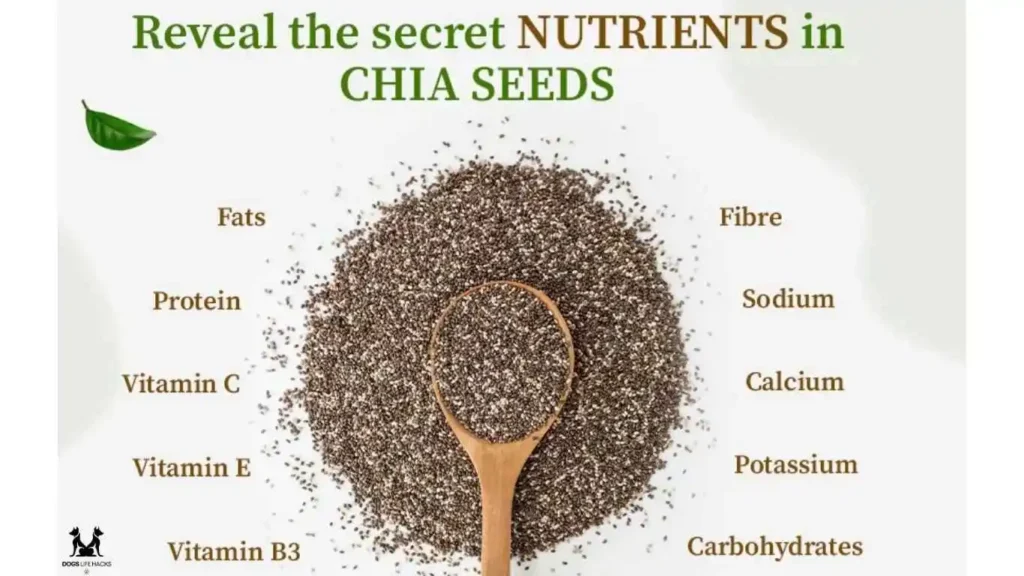
Omega Fatty Acids
These fatty acids are important for a healthy skin coat, as well as, anti-inflammatory processes and health in general. It is mostly helpful for those dogs that have skin complications such as allergies.
Fiber
Fibre is well known to improve digestion and prevent obesity due to the sense of bulkiness it imparts. It is highly helpful, especially to breed dogs undergoing diet regimens for food allergies.
Antioxidants
This means that incorporation of chia seeds into the diet of your dog will assist in fighting free radicals within the body thus helping to minimize ailments that may be major threats to the life of your pet.
Essential Minerals
Chia seeds also contain essential minerals which include, calcium, phosphorus, magnesium, and zinc all of which are significant in bone health, energy, and immunity.
How Much Should I Be Feeding?
About chia seeds, the quantity that should be given to a dog depends on the size of the seeds given that smaller seeds lead to more portions.
Small dogs should be given one teaspoon while the medium ones should be given two teaspoons and large dogs should be given up to one tablespoon. It is always advisable to seek the services of a vet before bringing any change to your pet’s diet plan.
Chia Seed Recipes for Dogs
How Can dogs eat chia seeds? Ready to get creative? Here are some chia seed recipes your dog will love:
Blueberry & Peanut Butter Frozen Dog Treat Recipe
Ingredients:
- 1 cup plain Greek yogurt
- 1/2 cup blueberries
- 1 tablespoon peanut butter (ensure it’s xylitol-free)
- 1 teaspoon chia seeds
Instructions:
- Blend all ingredients until smooth.
- Pour into ice cube trays and freeze for 4 hours.
Serve as a refreshing treat!
Dog Cookie Recipe
Ingredients:
- 1 cup whole wheat flour
- 1/2 cup oats
- 1/4 cup chia seeds
- 1/2 cup peanut butter
- 1/2 cup water
Instructions:
- Preheat the oven to 350°F (175°C).
- Mix all ingredients in a bowl until a dough forms.
- Roll out the dough and cut into shapes.
- Bake for 20 minutes or until golden brown.
Raspberry Chia Dog Treats
Ingredients:
- 1 cup raspberries
- 1 tablespoon chia seeds
- 1/2 cup plain yogurt
Instructions:
- Mash raspberries and mix with chia seeds.
- Let it sit for 10 minutes to thicken.
- Mix with yogurt and serve as a treat.
How to Prepare Chia Seeds for Dogs
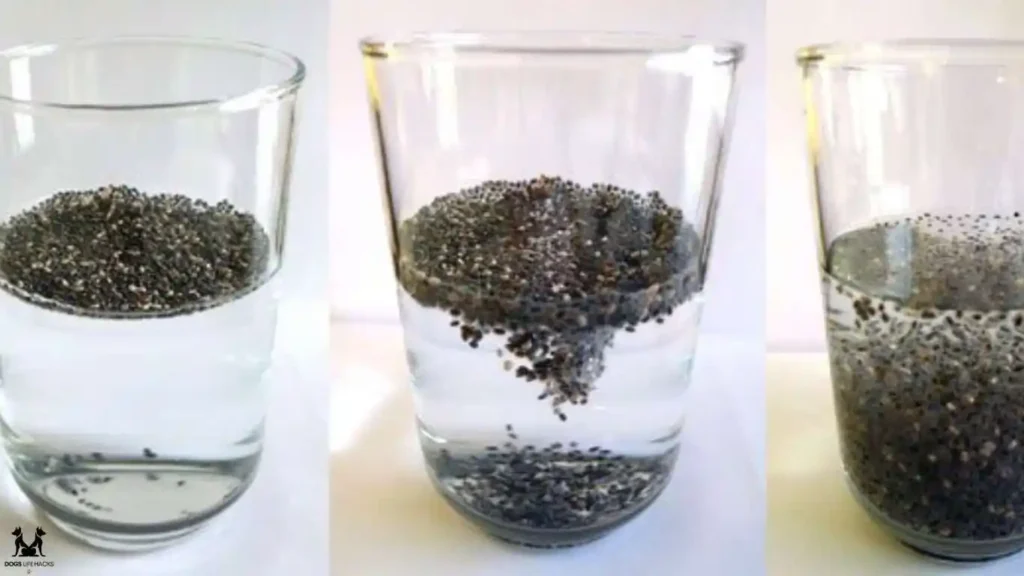
Before giving chia seeds to your dog it is important to know if Can dogs eat chia seeds, it’s best to soak them in water for about 10 minutes. This not only makes them easier to digest but also reduces the risk of choking. You can mix the soaked seeds into their food or add them to homemade treats.
Is Chia Seeds Harmful to My Dog’s Health?
Even though chia seeds are regarded as rather harmless you have to make it clear that Can dogs eat chia seeds, they are choking hazards if ingested improperly. Each should always be soaked and slowly introduced into the system. Furthermore, eating foods high in calories is unhealthy and more so when taken in humongous proportions; thus, Meal should be taken in moderation.
Can dogs eat chia seeds every day?
Yes, dogs can have chia seeds daily provided one gives the right portion that will suit the size of the dog especially if the dog does not show any side effects such as vomiting or loose stool. If consumed regularly then it can offer continued health benefits but it is always advisable to consult with the veterinarian.
Will Chia Seeds Ease Constipation?
Yes, the high fiber content in chia seeds can help in the relief of constipation in dogs. As chia seeds can swell up when soaked in water they facilitate bowel movement in dogs.
Can Chia Seeds Kill Dogs?
It is necessary to mention that chia seeds are safe to be fed to dogs and do not cause any harm even when used in moderation. However, there are instances when choking can occur or when there are severe allergic reactions, such instances are fatal. Chia seeds should always be eaten safely, especially when they are used in large quantities.
Final Thoughts on Can Dogs Eat Chia Seeds
Chia seeds should be introduced into the diet of the dog since they are extremely nutrient-dense and promote the well-being of the animal. The tiny seeds which are cruciferous are really powerful and do wonders for our body in many ways, including strengthening the brain much as improving digestion among other things.
However, it is also very important to understand that like with any supplement, the key word is moderation. Begin with a small quantity, observe its reaction, and convert your dog’s diet with a variety of ways that chia seeds can benefit your pet.
Frequently Asked Questions
How many chia seeds can you give a dog?
Since chia seeds have a relatively bland taste and aroma even the most selective of canines will eat them. Even just a little is enough that you have to extend or give out your hand and offer it or can dogs eat chia seeds?
The dosage is 1/4 teaspoon once per day for every ten pounds of your dog’s weight. They can be added and tossed onto food or you have to take a cup full of the seeds and boil water and make a pudding out of it which is a good snack or food topping.
Will chia seeds help a dog with diarrhea?
Chia seeds support healthy digestion: These little tiny seeds are packed with fibers that are very essential in enhancing the digestion process. It helps to maintain bowel movement for your dog and may go further to help minimize stomach upset such as gas, bloating, or diarrhea.
Is flaxseed or chia seeds better for dogs?
Chia is believed to improve the immunity system and is attributed for maintaining of electrolytes in dogs. Flax is a good source of fiber and both are very rich in anti-inflammatories. Note: Ideally both should be kept in the refrigerator.
What happens if my dog eats chia?
Even though chia seeds have been determined to be safe and non-toxic to your companion animals, you should exercise some restraint with how you incorporate the seeds into your pet’s diet.
They cannot be categorized as choking hazards due to their size but you could try boiling the seeds and then serving them while still warm to your dog.
Does chia seeds harden stool?
Though chia seeds contain large amounts of fiber, almost all of it is insoluble fiber, which does not dissolve in juice. But what it does is, it only absorbs fluids and contributes to the formation of loose and big volumes of feces.
Well yes, it does contain the kind of fiber you want to encourage more frequent bowel movements and some relief from constipation.
Related Articles
- What to Do If Cut On Dog Paw Pad: Comprehensive Guide
- Healthy Chews for Dogs That Clean Teeth & Satisfy Cravings!
- Stop! Can Dogs Eat Feta Cheese? Safe or Harmful? Find Out!
- How to Soothe Dog With Itchy Ears – Here’s the Solution
